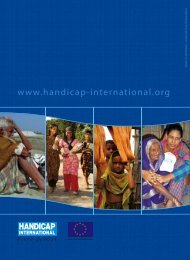Full page photo print - Harvard Law School Project on Disability
Full page photo print - Harvard Law School Project on Disability
Full page photo print - Harvard Law School Project on Disability
You also want an ePaper? Increase the reach of your titles
YUMPU automatically turns print PDFs into web optimized ePapers that Google loves.
has been the victim of a crime may wish to report the crime to the police and press charges<br />
against the offender. However, if he or she is denied physical access to the police stati<strong>on</strong>,<br />
clear communicati<strong>on</strong> with the police, or access to informati<strong>on</strong> that is understandable, then<br />
that pers<strong>on</strong> may not be able fully to exercise her or his rights as a victim. These examples<br />
dem<strong>on</strong>strate that human rights are indivisible, interdependent, and interc<strong>on</strong>nected.<br />
The enjoyment of other human rights can also positively or negatively impact the ability<br />
of people with disabilities to enjoy access to justice. For example, the accessibility of<br />
transportati<strong>on</strong> may determine whether or not a pers<strong>on</strong> with a disability is able to travel to a<br />
police stati<strong>on</strong>, courthouse, or other place where justice is administered. Similarly, a pers<strong>on</strong> with<br />
a disability who has had access to a quality educati<strong>on</strong> will be better able to understand and use<br />
the justice system, but if she or he has been denied the right to educati<strong>on</strong>, then participati<strong>on</strong> in<br />
the justice system may be difficult or impossible.<br />
To be fully included in society, people with disabilities need access to justice. As l<strong>on</strong>g as they<br />
face barriers to their participati<strong>on</strong> in the justice system, they will be unable to assume their<br />
full resp<strong>on</strong>sibilities as members of society or their rights. For this reas<strong>on</strong> it is important that<br />
barriers be removed so that people with disabilities can enjoy the equal opportunity to perform<br />
their duties as witnesses, jurors, lawyers, judges, arbitrators, and other participants in the<br />
administrati<strong>on</strong> of justice.<br />
exeRcise 12.1: Turning to the Justice system<br />
objective: To recognize the complexity of the justice system and how people use it<br />
Time: 30 minutes<br />
materials: Chart paper and markers or blackboard and chalk<br />
1. brainstorm:<br />
Ask participants to name some typical reas<strong>on</strong>s that people in their community turn to the<br />
justice system. List as many of these as you can <strong>on</strong> a chart like that below. Include issues<br />
related to property, family matters, violent crimes, or instances where <strong>on</strong>e pers<strong>on</strong> has hurt<br />
another but it is not c<strong>on</strong>sidered a crime (e.g., making false spoken or written statements<br />
about a pers<strong>on</strong>). For each reas<strong>on</strong> given, ask what instituti<strong>on</strong>s people turn to for justice in each<br />
situati<strong>on</strong> (e.g., police, council of elders, religious authorities, magistrates, courts). List these <strong>on</strong><br />
the chart.<br />
2. list:<br />
Ask what are the various roles individuals play in these instituti<strong>on</strong>s of the justice system<br />
menti<strong>on</strong>ed in Step 1 (e.g., victim, perpetrator, witness, police, elder, lawyer, judge, specialized<br />
expert, juror, pris<strong>on</strong> official) and list these <strong>on</strong> the chart.<br />
• Do people with disabilities usually play any of these roles in your community? Check<br />
those that apply.<br />
3. discuss:<br />
C<strong>on</strong>sider those roles that people with disabilities do not play:<br />
• What happens when people with disabilities are excluded from these roles and thus<br />
from full participati<strong>on</strong> in the justice system? To the pers<strong>on</strong> with disabilities? To the justice<br />
system?<br />
• Why do you think people with disabilities are excluded from these roles?<br />
PART 2: The c<strong>on</strong>venTi<strong>on</strong> <strong>on</strong> The RighTs of PeRs<strong>on</strong>s wiTh disAbiliTies<br />
159




